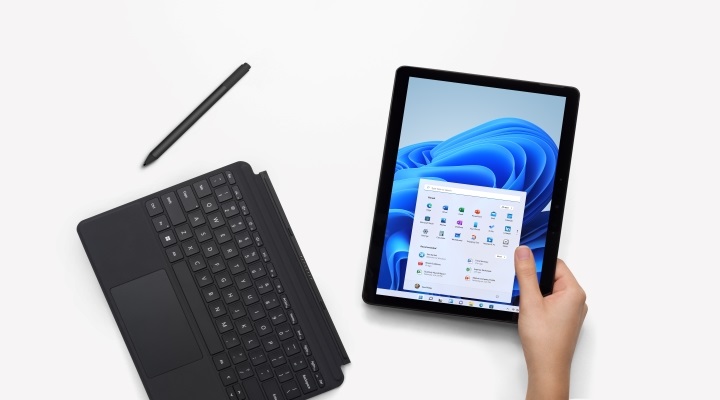With the accelerating trend towards hybrid workplace models, small and medium businesses across the nation are faced with having to reassess their approach to the technology and software they use.
The COVID-19 pandemic has forced many companies to implement work from home policies or a hybrid approach where employees spend two or three days a week working from home, the balance at the office. Whereas five years ago, many organisations were still reliant on traditional desktop computers, the pandemic has made notebooks an essential tool for many.
“We are seeing the market demand for notebooks growing – and not only for notebooks, but people are really thinking about what style of notebook they want to have,” Charis Jamieson, Surface Product Marketing Manager for Australia and New Zealand, tells Inside Small Business. “They don’t want to be humping around a heavy device in their backpack, for example.”
With people working in multiple locations and using portable devices more, security has become paramount for businesses. Jamieson cites a recent study by Gartner that found that 70 per cent of organisations did not have a formal strategy throughout the past year, leaving them at risk of a cyber-attack. Now they must address that issue – and be sure the devices they are buying for themselves or their staff keep the company’s data and communications secure at all times.
“We know that ransomware and cyber attacks are happening,” Jamieson says. “These aren’t new phenomena, but the interesting thing is that a lot of the criminals involved are not doing things much differently to the way they did five years ago – they’re just having more success with it.”
The implication is that a more mobile workforce, connecting over multiple networks – in offices, homes and cafes, for example – is creating more opportunities for cybercriminals.
“Microsoft knows that a cyber attack can put an SME out of business. So we are really passionate about delivering interfaces that have security on every device layer.”
A hybrid solution for a hybrid workplace
For many, home has become the ‘new office’ and a measure of an employee’s productivity – and even the whole employee experience – is impacted by how good their device is. So hybrid work solutions are more critical than ever before.
Microsoft believes the combination of its Surface products and its newest Windows operating systems afford a higher level of security usability than alternatives. From being able to unlock a device using facial recognition to the combination of ‘first-party’ hardware and software integration, Surface is designed and engineered to deliver the best Windows, Office and Microsoft 365 experience.
Surface devices are themselves hybrid by nature: a traditional clamshell-style notebook, convertible into a tablet by removing its cover, and with a touch screen allowing one to write notes directly onto the screen and thus the device’s memory.
“From a form perspective, it’s super light, it’s super portable, it’s a two-in-one device, meaning you can use it as a tablet, but then you can also use it as a traditional laptop.”
Jamieson says small and medium-sized businesses across multiple business sectors are adopting the Surface solution, including retailers, manufacturers and health care operators. For example, the portability of Surface devices and their adaptability from notebook to tablet means customers can sign contracts on screen with DocuSign on a showroom floor.
A sustainable future
Australia has committed to net-zero emissions by 2050 and many businesses – including Microsoft – have already implemented complex plans to achieve their own net-zero status ahead of that time, some as early as 2030.
Jamieson says Microsoft’s journey to a sustainable future will be spearheaded by innovation.
“For the nation to achieve its ambition, the road to net zero must be paved by action as well as good intentions.
“We’ve been talking to a lot of partners and customers many of them have been asking what Microsoft is doing towards sustainability. In terms of devices, we are working towards 100 per cent recyclable packaging across the entire range and every component of Surface devices will be recyclable by 2030,” she says.
“Microsoft devices have that integrity belt across the entire product lifecycle, from design right through the supply chain.”
Jamieson says secure, modern, sustainable technology is imperative in today’s modern business.
“When we consider this shift to hybrid work and how the collective experience has left a mark on how we define and prioritise work in our lives – including security and sustainability – the computing device of employees is even more critical.”
With the end of the financial year looming, Jamieson recommends SMEs research and consider opportunities to take advantage of government incentives and subsidies to upgrade their business tools.
“Certainly for small businesses, there are a lot of amazing schemes that the government put in place that make it more affordable for small businesses to buy at this time. Our message to small businesses is to think about how you want to grow your business. Talk to your technology partners. Talk to Microsoft about the technology we have available to help your business grow and to future proof your business.”
Find out more about Business Laptop & Computer Deals from Microsoft Surface for Business here.











